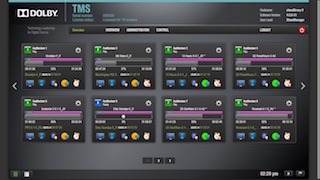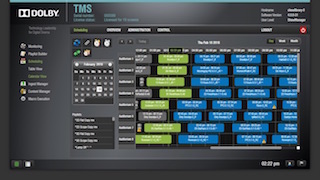 It is challenging to run a modern digital cinema theatre complex without theatre management software, which raises the question: who would want to? TMS has streamlined the exhibition business and opened the door to possibilities that were not even imagined more than a decade ago. With CinemaCon 2016 set to convene next month in Las Vegas one thing is certain: TMS will be a major topic at the show. To help readers stay abreast of the latest developments in Digital Cinema Report asked leading manufacturers what we can expect at the show. In part two of our ongoing series I spoke via email with Jed Harmsen, senior director, cinema products, Dolby Laboratories.
It is challenging to run a modern digital cinema theatre complex without theatre management software, which raises the question: who would want to? TMS has streamlined the exhibition business and opened the door to possibilities that were not even imagined more than a decade ago. With CinemaCon 2016 set to convene next month in Las Vegas one thing is certain: TMS will be a major topic at the show. To help readers stay abreast of the latest developments in Digital Cinema Report asked leading manufacturers what we can expect at the show. In part two of our ongoing series I spoke via email with Jed Harmsen, senior director, cinema products, Dolby Laboratories.
Digital Cinema Report: Briefly describe your company’s line of TMS products and services.
Jed Harmsen: Dolby Theatre Management System (TMS4) is a comprehensive theatre management system that simplifies and streamlines digital cinema operations. Offering a robust set of capabilities from automated content transfers, easy show playlist and schedule management to detailed device monitoring and reporting and broad POS schedule integration support, TMS 4 is a complete digital cinema workflow management solution.
Key features include KDM management, content management including manual and automated transfers with priority based on schedule, show playlist building, schedule management, playlist pack functionality for easier pre-show advertisement and trailer management, scheduled audit log report generation, and projector status monitoring.
DCR: What are you highlighting at CinemaCon 2016?
JH: At CinemaCon 2016 Dolby will highlight a full range of integrated, end-to-end audio, imaging, accessibility and post-production solutions for the cinema industry.
With more than 1,600 Dolby Atmos screens installed or committed spanning over 60 countries, more than 130 mix facilities worldwide, and 400 titles announced with support from all major Hollywood studios and countless international distributors, Dolby will be highlighting the global success of Dolby Atmos and new, affordable, and innovative ways exhibitors can look to bring Dolby Atmos to additional screens in their complex.
Dolby will also be showcasing the Dolby Integrated Media Server IMS2000, which is the next-generation offering in Dolby’s Integrated Media Server line of products. The Dolby IMS2000 is a single-board solution that provides high uptime to keep the show running and protect revenue streams. The Dolby IMS2000 offers cost-effective reliability based on a server platform proven on over 90,000 screens worldwide, plus the flexibility you need for today’s cinemas.
 Last, but certainly not least, Dolby will be highlighting its award winning Dolby Cinema offering which is supported by all the major Hollywood studios. In just over a year, more than 200 Dolby Cinema sites have been installed or committed across the globe, with 24 titles released or announced.
Last, but certainly not least, Dolby will be highlighting its award winning Dolby Cinema offering which is supported by all the major Hollywood studios. In just over a year, more than 200 Dolby Cinema sites have been installed or committed across the globe, with 24 titles released or announced.
DCR: In your view, what have been the biggest developments in theatre management technology in the past decade?
JH: The last decade was really about the transition to digital cinema and its associated workflows as well as satisfying the requirements of VPF contracts. The next decade is likely where we will see much bigger developments in theatre management.
DCR: Is there an opportunity in the market to provide a full suite of software and services including POS, TMS, and NOC Services? If so, what is your company doing in this area?
JH: It will likely take longer for the various entities within the exhibition business to come together to integrate their workflows, and so it may be a while before we see a single suite of software that encompasses all these aspects. That said, there are areas where the exhibition and business tools can begin to integrate and merge, and we are keenly interested in those opportunities.
DCR: Many exhibitors have told me that they would like to see software that can manage event cinema ticket sales. How does your company address this issue?
JH: TMS can play a part in ensuring that the content gets to the right place at the right time.
DCR: Along those lines, do you believe that cinema on demand in movie theatres is possible and, if so, what role can TMS play?
JH: TMS will likely be the entry point for external systems to gain access to devices in the theatre, so certainly there is a role to play in facilitating on-demand content playback.
